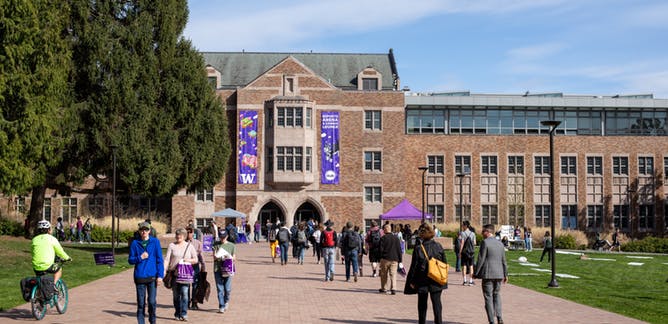
According to recent data, roughly 6.3 million U.S. college students took at least one online course during the fall 2016 term. This figure represents an annual increase in distance learner enrollment over the past 14 consecutive academic years. But finding great online colleges can be difficult because each institution is so different. To help find the best online college for you, we cover important topics like accreditation, financial aid, and other baseline considerations to make when choosing from top-rated online colleges below.
Top 10 Accredited and Affordable Colleges Online
- Northern Arizona University
- The University of Alabama
- Judson College
- Seina Heights University
- North Carolina State University
- The University of Southern Mississippi
- Saint Leo University
- The Univeristy of Illinois at Springfield
- Mississippi College
- Webster University
How Online Colleges Work
Although online and brick-and-mortar courses share similarities in terms of readings, lectures, and assignments, these programs also differ in several ways. Additionally, finding great online colleges can be difficult due to the wealth of differences between each institution. Here are answers to some of the most common questions about online versus brick-and-mortar programs.
1. How are online courses delivered?
Most online courses require students to log into their school’s learning management system (LMS), a comprehensive platform that contains course syllabi, assignments, and students’ grades. Before enrolling in courses, online students should research hardware and software requirements for their school’s LMS to ensure their computer is compatible. Additionally, students can use smartphones and tablets to access their school’s LMS. The best online university programs offer multiple accessibility options for distance learners.
Online courses often consist of required readings and lecture videos, which may be livestreamed or prerecorded. Distance learners can complete these assignments entirely online. Some courses also include discussion elements; in these cases, students typically participate in group chats with their professors and fellow classmates. Some online courses also feature in-person components, such as site-based practicum training. These courses are known as “blended” because they integrate online and brick-and-mortar elements.
2. Are online courses self-paced?
Some online courses are self-paced, or asynchronous. In this format, students may complete their assigned readings and lectures, in addition to exams, on their own timetable — though some asynchronous courses may require weekly check-ins. Courses that are synchronous, or not self-paced, typically mirror the weekly assignment format of campus-based courses. Good online colleges offer a mix of asynchronous and synchronous pathways to accommodate students with different preferences and schedule restrictions.
3. Do online courses include any in-person requirements?
Many online courses incorporate in-person training and networking into their curricula. This is especially common for programs in fields that require in-person experiences for postgraduate licensure, such as education or nursing. Additionally, some distance courses require students to meet with classmates for team building or project work.
4. How are online course exams administered?
Online courses frequently include at least one examination. To mitigate the risk of cheating, distance learners may need to take the exam at a testing facility with a proctor. Alternatively, the course’s professor may administer the exam online and monitor students using webcams or anti-cheating software. However they are administered, these exams are typically as rigorous and demanding as those completed in classrooms.
5. How long does it take to earn a degree online?
Some online programs feature an accelerated format and require less time to complete. These include bachelor’s programs that can be finished in fewer than four years and master’s programs that take less than two years. However, most online degrees match their brick-and-mortar counterparts in terms of completion time.

